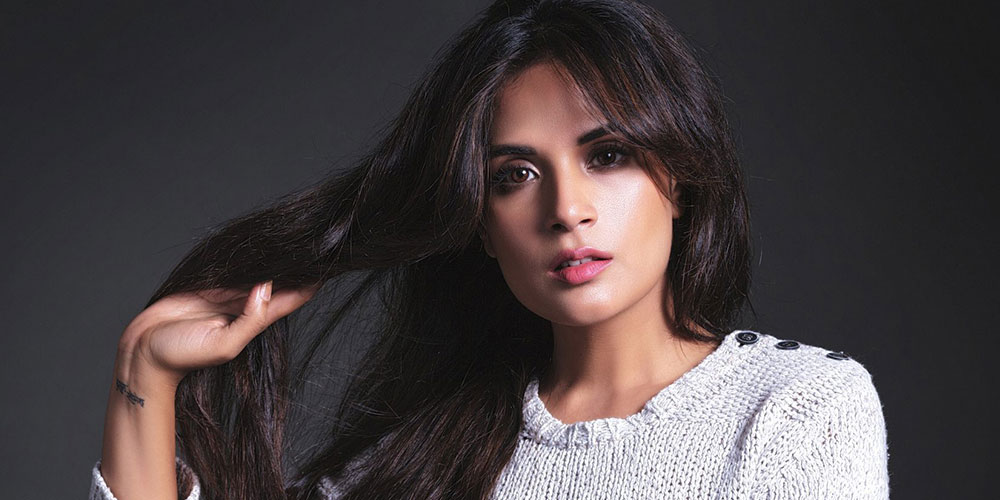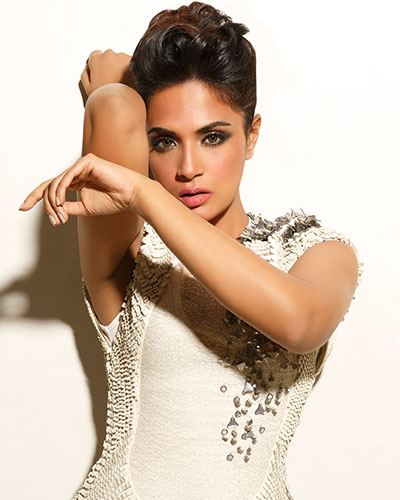THREADS OF SUCCESS
- 06 Apr - 12 Apr, 2024

I was told Richa Chaddha was looking forward to our conversation. So was I. I noticed Richa with the rest of the commercial world in Fukrey. It took me a while to connect to the rest of her career, which included Oye Lucky! Lucky Oye!, Gangs of Wasseypur (where she won the Filmfare for Best Actress according to Critics), Goliyon Ki Rasleela Ram-Leela, Tamanchey and Masaan.
On a very bad connection over the phone, I ask if she had found, at least, some time for a breather. Richa laughs, and tells me that she will soon start travelling for her latest movie Fukrey Returns. She had just finished a Facebook Live session.
We start talking about Bholi Punjaban – her character in Fukrey series that walks a very fine-line between good and bad. What really has changed since we last saw her, I ask. “[She did] not really change. She’s the same person. The only difference from the last film is that she’s angry. She’s upset. Her business has shut down, so, she’s come back for revenge.”
I was always fascinated by the tone of that character, I tell her. Not really black, not really white. A villain who is bad, but not that bad, and has a love-line with a character, who, on the surface, didn’t really fit the profile of the lead.
“It’s too much for the audience to completely paint a woman as a black character. They don’t accept it easily,” she replies. “This character is very tricky, that’s why we wanted her to be likeable.”

How much did Richa put into the character, I enquire. “This is a very difficult thing to answer as an artiste. You cannot take the full credit of something, and then at the same time, you can’t not give yourself credit,” she says.
“I followed exactly what was written in the script, but every actor will bring some sense of character, by emoting with their body and how their expressions are. So, in that sense, I have definitely brought some of my own experiences in playing her.”
Elaborating on Bholi Punjaban, Richa says “She’s somebody who started [working] at a young age. She’s kind of a bully. She is street-smart and knows how to survive anywhere. I find her very quirky and fun – a very liberating character to play.”
Does Bholi and Richa share similarities? “I don’t even like berries, I don’t wear leather. I am a different kind of non-violent creature. Bholi’s character is very different. She enjoys hurting people. The one thing we have in common is both, Bholi and I are strong women. We are not less than the male members. I think Bholi is the other end of Fukrey, she is an integral part of the story and takes it forward.”
“The funny thing is,” she continues, “Bholi saw through the boys’ scheme. [In this movie, it] seems like she’s also in a bit of [problem]. That there’s someone threatening even Bholi. There’s someone even she’s scared of. So, I am waiting to see how the audience responds to that.”
Will the audience see some progress in Bholi’s character? “There’s a development in Bholi’s character that was [astonishing] even for me when I read the script for the first time. Whether it’s positive or negative, I can’t tell. I don’t want to reveal more because that would take away the fun you will have when you watch the film.”
Speaking about her male counterparts, Richa explains Bholi’s perspective, “Choocha, [played by Varun Sharma] is actually an adult, but talks like a child. There’s a strange dynamic of ‘Oh, you’re dumb, but I’ll tolerate you’ between Bholi and him. He’s funny and you want to tolerate him if you want the good from him, it’s that sort of thing. [Actually], she has the same kind of sarcastic demeanour for everyone. That’s kind of her relationship with all of them. She’s identified what to expect from whom. She’s made a lot of calculations in her head. That’s what I love about this woman.”
One wonders if she expeced the first Fukrey to be a hit or was there always going to be a second part? “I don’t think that was intentional. Excel wanted to experiment in a smaller budgeted film for a targeted audience. It became such a phenomenal hit that everyone wanted to see more of these ‘fukras’, so [the writer-director] started writing the second part,” she shares.
When asked if she is aware of the Pakistani film and television industry, Richa says, “I watched Khuda Kay Liye, when it came out. I used to love this show called Aunn Zara. The lead actress [Maya Ali] blew my mind. I just loved her!” Regarding the cultural divide, she says that the gap would only be filled by artistes. “Politicians sey toh kuch bhi nahi hoga. We’re the only ones who can bring cultural change.”
For the next few minutes we talk about Pakistan and India, especially on how lacking – and at times, misleading – most of the media is.
“I wish [the lack of information about Pakistan in India] would change. I wish whichever government is in power, they do more than just lip service for the cause of cultural exchange. When you watch Pakistani shows, you realise that there’s not much of a change.
“I have a different view of partition,” she continues. “I think the partition was done only to create a balance of power. A united India would have been very difficult to handle for the British, so they created something that would safeguard their interest. They did the same in most parts of the world. Both countries can develop a lot more if we are at peace with each other, if we didn’t have to spend so much on warfare. People should be nice to each other. If that happens, cultural exchange would be easier,” Richa signs off.
COMMENTS